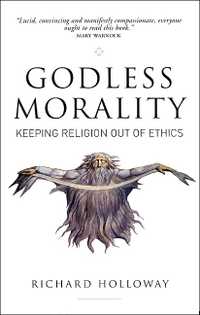Godless Morality:
Keeping Religion Out Of Ethics
By Richard Holloway
Canongate Books, 163 pages
ISBN: 0862419093
Reviewed by Malcolm Boyd
There seems to be a global civil war between adherents of religion, and it is drawing nearly everybody else into the melee.
Some people say it’s about interpretation of scripture while others claim it’s somehow related to what different folks do in bed—or on the sun deck.
Richard Holloway clearly states what’s emerging as a more and more prevalent view: “In fact, we no longer treat an injunction from scripture as having moral authority over us simply because it is in scripture. It has to have moral force independent of its scriptural context.” This would have seemed scandalous not too many years ago. Now many of us judge scripture by our own best moral standards, not the other way round. Holloway believes we do this in most areas except “the area of sexual behavior.”
I wonder. He acknowledges that the impetus of social reform usually happens “with the church right at the back of the procession.” At the present time, if the church wishes to remain back there—or seemingly can’t help itself, I think it may find that it has lost touch with a majority of people including an entire youth generation. If this happens, the church’s practice of identifying itself with God could turn into madly self-destructive exercise of irrelevance. God is not mocked. However, the church—when it keeps the trappings of religion, while abandoning all social and moral relevance—mocks itself.
Holloway is extremely helpful when he points out the “distinction between the priestly and prophetic poles in religion.” He is aware that the tension between the two is expressed, though not resolved, in the Bible. He goes on to say: “It is true that the priestly, controlling type of consciousness retrojected into scripture a dominant editorial overview, but the prophetic voice was never silenced, the voice of the critic and satirist, the voice we hear in Jesus.”
I find this close to the heart of the matter. Holloway is prophetic in his claim that most moral systems have reflected and given support to external structures of authority “because until very recent times most human systems were systems of command: domination systems, based on an ethic of obedience to authority.” When God was invoked, it was felt there could be little opposition. This assumed awful social and political implications when the divine right of kings was the rule of the land. Yet Holloway prophetically points to “the living word of Jesus that challenges us to follow the logic that scripture was made for humanity and not humanity for scripture.”
Holloway cites principles that we hold on moral, not theological, grounds. One is “Thou shalt do no murder.” It is accepted by unbelievers and believers alike. He believes if the church’s unity disintegrates over sexuality issues, “it will be because of disagreements over theology and philosophy, not because of sex.” In his view we confront a culture of injustice as well as “ingratitude for the contribution that gay and lesbian people have made to the life of the church down the centuries.”
A writer and broadcaster, Holloway was Bishop of Edinburgh and Primus of the Scottish Episcopal Church until 2000. His work here is brave, groundbreaking, always lucid. He is a prophet of our times.
The Rev. Malcolm Boyd, author of 30 books, most recently In Times Like These, is a frequent contributor to White Crane and lives in Los Angeles.
